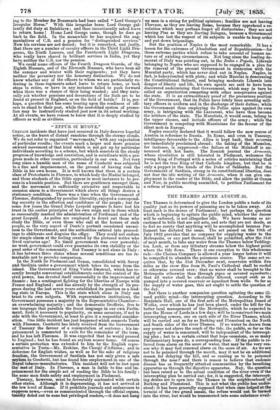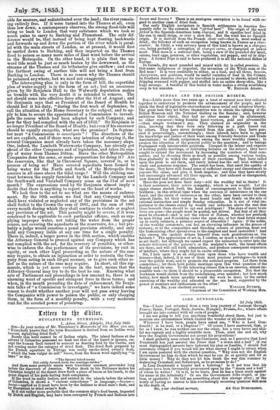THE THAMES AFTER AUGUST-31.
THE Thames is determined to give the London public a taste of its quality just as its powers of poisoning are to be taken away. At least such is the decree of Parliament; but perhaps the question which is beginning to agitate the public mind, 'whether the decree will be enforced, is not altogether idle. We have become so ac- customed to bills that are not acts, and acts that are not deeds, as to feel no surety that anything will be accomplished because Par- liament has dictated the same. The act passed on the 18th of July 1852 provides that no company for supplying water to the Metropolis, or any part thereof, shall be permitted, after the 31st of next month, to take any water from the Thames below Tedding. ton Lock, or from any tributary streams below the highest point where the tide flows. There is one exception to this wholesome rule—the Chelsea Company is allowed a year longer before it will be compelled to abandon the poisonous source. The same act re- quires that, by the 31st December next, reservoirs within five miles as the crow flies from St. Paul's Cathedral shall be roofed or otherwise covered over; that no water shall be brought to the Metropolis otherwise than through pipes or covered aqueducts ; that all water shall be effectually filtered, except such as is pumped into a covered reservoir or aqueduct from wells. So far as the supply of water goes, this act ought to settle the question of the day. But there is another companion question agitating the same ill- used public mind—the intercepting question. According- to Sir Benjamin Hall, one of the first acts of the Metropolitan Board of Works, over which he has just been placed, under the bill for the better local management of the Metropolis, which he expected to pass the House of Lords in a few days, will be to-construct two main intercepting sewers, one on each side of the River Thames, which will be carried out as far as Barking and Plumstead on the North and South sides of the river Thames. If no water be drawn from any source not above the reach of the tide, the public, so far as the supply of water is concerned, will be independent of the intercept- ing plan ; but to a certain extent that hope occasions, as so many Parliamentary hopes do, a corresponding fear. If the public is re- lieved from alarm on the score of water, that may be the very rea- son why it may feel renewed alarm on ihe score of air. As we are not to be poisoned through the mouth, may it not be an additional reason for delaying the bill, and so causing us to be poisoned through the nose? and there is reason to believe that endemic disease has as frequently attacked communities by the breathing apparatus as through the digestive apparatus. Nay, the question has been raised as to the actual condition of the river even if the intercepting plan be carried out; for, it is suggested, the intercept- ing drains are to open into the Thames in the neighbourhood of Barking and Plumstead. This is not what the public has under- stood: it has been generally supposed that when once lodged at the termini of the two grand canals, the refuse would not be turned into the river, but would be transmuted into some substance avail-
able for manure, and redistributed over the land ; the river remain- ing entirely free. If it were turned into the Thames at all, even thus low down, a contemporary observes, the strong flood-tide will bring us back to London that very substance which we took so much pains to carry to Barking and Plumatead. The only dif- ference would be, that instead of being kept floating backwards and forwards up and down the portion of the river which is paral- lel with the main streets of London, as at present, it would first be carried down to Barking, and then imported on the Thames flood to poison so many more miles of East wind before the arrival in the Metropolis. On the other hand, it is plain that the up- ward tide must be just so much beaten by the downward, as the streams of the Thames and its tributaries give outflow ; and even the furthest swing of surface tide will not bring a float from Barking to London. There is no reason why the Thames should be poisoned anywhere, but we need not exaggerate.
The intercepting plan is only in the form of bill, the supertidal plan of water-supply is in the form of an act; but an assurance given by Sir Benjamin Hall to the Walworth deputation makes us tremble with the very doubt it is intended to remove. The act should come into effective force after the 31st of August ; and Sir Benjamin says that as President of the Board of Health he should feel it his duty, "during the first week of September, to call the attention of the Home Secretary to the subject, and to ap- ply to him to secure the appointment of a Commission to investi- gate the course which had been adopted by each Company, and how far they had complied with the act of 1852." Sir Benjamin is no longer President of the Board of Health; but even if his successor should be equally energetic, what are the promises P In Septem- ber next "a Commission to investigate" ! The directions of the act are explicit, and if there were any intention of obeying it, the several Companies must already have taken the necessary steps. One, indeed, the Lambeth Waterworks Company, has already got abead of the other Companies and of legislation, and takes its sup- Cly of water from Thames Ditton. Have the other Metropolitan ompanies done the same, or made preparations for doing it P Are the reservoirs, like that in Claremont Square, covered in, or in process of being so ? Have covered aqueducts been formed to bring water for the North and South of the Metropolis from sources in all cases above the tidal range ? Will the striking con- trast between the supply furnished by the Lambeth Company and the Southwark and Vauxhall Company cease on the 31st of next month ? The expressions used by Sir Benjamin almost imply a doubt that there is anything to report on the head of works. We look then to the act to see what are the means of enforce- ment. By the 16th- section we find that any Company which shall have violated or neglected any of the provisions in the act shall forfeit to the Crown the sum of 2001., and the sum of 1004 every month during which they shall continue to violate or neglect any provision of the act. This penalty might be severe, if it were construed to be applicable to each particular offence, such as sup- plying improper water, not taking the water from the proper source, not covering the aqueducts or the reservoirs, &o.; but pro- bably a judge would construe a penal provision strictly, and only hold any Company liable at any one time for a single penalty. There is, indeed, a larger power in the 20th section, which enables the Attorney-General to proceed against any Company which has not complied with the act, for the recovery of penalties, or other- wise to enforce the due performance of its provisions, by snit in equity, or such other legal proceeding as the nature of the case may require, to obtain an injunction or order to restrain the Com- pany from acting in such illegal manner, or to give such other re- lief as the nature of the case may require. In short, all this rig- marole, which is yet more verbose in the text, means that the Attorney-General may try to do the best he can. Knowing what acts of Parliament and proceedings in law amount to, there is an alarming want of specific and stringent force in these terms ; and when, in the month preceding the date of enforcement, Sir Benja- min talks of "a Commission to investigate," we have indeed some reason to doubt whether another year will not pass away leaving the Companies with power to poison the public, or only charging them, in the form of a monthly penalty, with a very moderate rent for the coveted power of poisoning.



























 Previous page
Previous page